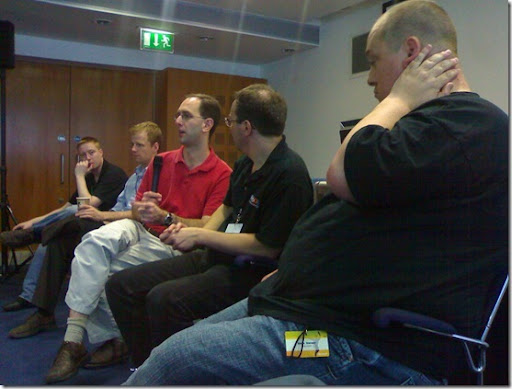I love reading
Scott Hanselman's blog. I missed a great post back in May, '
Is Microsoft losing the Alpha Geeks?' In it he talks about his recent visit to
RailsConf where he was very impressed by the energy of the
Ruby-on-Rails (RoR) community. Unless you've been avoiding the blogosphere for the last couple of years, you'll know all about the incredible buzz around RoR. It's certainly taking a lot of the most respected people in the development community along with it, not least of all
Martin Fowler and his company
Thoughtworks. So Scott asks if Microsoft has lost it's way; is it 'losing the Alpha Geeks?' So what's an Alpha Geek? Let's assume for the sake of argument we're talking about the guys who actually move the industry forward, not just the people who really have a deep understanding of the technology, but the people who invent it. I don't think Microsoft are loosing them, because I don't think they ever had them in the first place.
Let's step back and think about innovation for a while. How does technology, or even in the broader sense, culture, change and advance? What kind of conditions promote innovation and which stifle it? The great thinker in this field was the economist
Joseph Schumpeter, he coined the phrase '
creative destruction', to describe the driving force of innovation in a capitalist economy. Essentially the rate of innovation is proportional to the number of people able to innovate; the number of minds allowed to tackle a particular question and the ability of individuals or groups to attempt to profit from their idea without a severe cost of failure. Capitalism thrives on huge numbers of small companies and entrepreneurs constantly trying and failing. A Darwinian survival of the fittest where the vast majority do not succeed. Indeed it goes beyond capitalism, Jarred Diamond's seminal work '
Guns, Germs and Steel', brilliantly shows how human development progressed in direct proportion to the size of human communities and the speed at which technological developments could be propagated. When you get bored of 'learn WPF in 21 days' it's must read!
The software industry is a pure manifestation of Schumpeterian economics. The barriers to entry are almost non-existant; anyone with an idea can have a go. It doesn't really make a lot of difference if you're a highly paid Microsoft employee or a Gujarati teenager with a computer, the quality of your ideas is the only thing that matters. In fact there are two good reasons why the Gujarati teenager has an advantage: Firstly he doesn't have to persuade his line manager that his idea is a good one before he's allowed to explore it; he can have a go at any hair brained wackiness he likes. His idea doesn't have to play nicely with any particular corporate strategy or favorite technology. Secondly, and conversely, he has to persuade the whole world that his idea is a good one. The Microsoft guy, once he's persuaded the company, will have the whole weight of Microsoft's marketing behind him and millions of Microsoft shops around the world will use his technology even if it's sub-optimal. But because the Gujarati teenager has none of this support his idea will only thrive if it's a really really good one.
So Microsoft's 1000's of highly paid geeks verses who knows how many millions of the rest of the world's programmers? It's no competition, the cutting edge will always be outside of Microsoft or any other corporation for that matter. I think Microsoft collectively knows this and the company has become a lot more responsive to good ideas coming out of the world wide software community. The new openness of public betas and shared source initiatives are evidence of this. Microsoft has also become much better at picking the best talents from the community, just take the example of
John Lam.
So what does this mean for the average Microsoft
Mort like you and me? Well, if you're interested in the state of the art and you want to see what the software world might look like in the next five or ten years, then you've really got to raise your eyes from the MSDN front page. You'll almost never see anything truly innovative there. And even when you do see something new there, there's no guarantee at all that it's a good idea. It hasn't been filtered by the community yet. When Microsoft has adopted something, it's not the cutting edge any more it's the mainstream. Take an interest in what's happening in the rest of the software world and occasionally try out something that's nothing to do with Redmond. Ruby on Rails obviously has something good going for it or there wouldn't be a whole lot of very clever people banging on about it all the time. Now this doesn't mean that you or I should suddenly abandon Visual Studio and everything we know for a Linux box, Emacs and a command line, but it does mean that it's worth keeping an eye on similar things that might be evolving in the .net ecosystem, like
Subsonic or
Monorail. And don't assume that ASP.NET is the only and best web development framework.
I hope this doesn't sound like I'm Microsoft bashing, indeed my whole career (and it's been a relatively prosperous and happy one so far) is built around Microsoft. I'm very happy with the Borg's new found openness and these days there's such a flourishing open source community around the Microsoft tools, especially .net, that you don't have to wait for corporate adoption before being able to integrate the best modern development techniques into your work.



